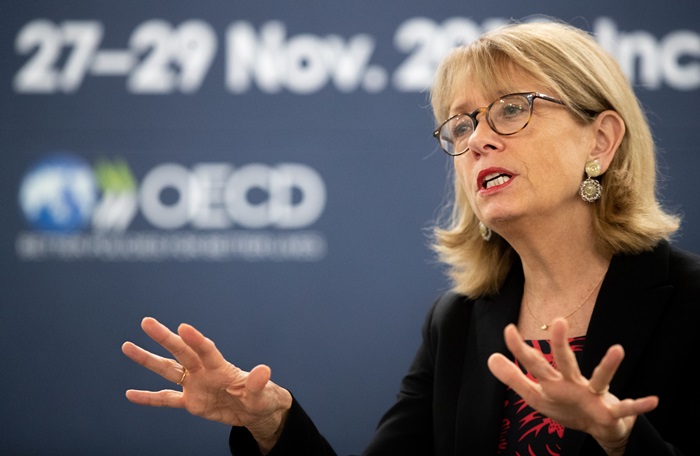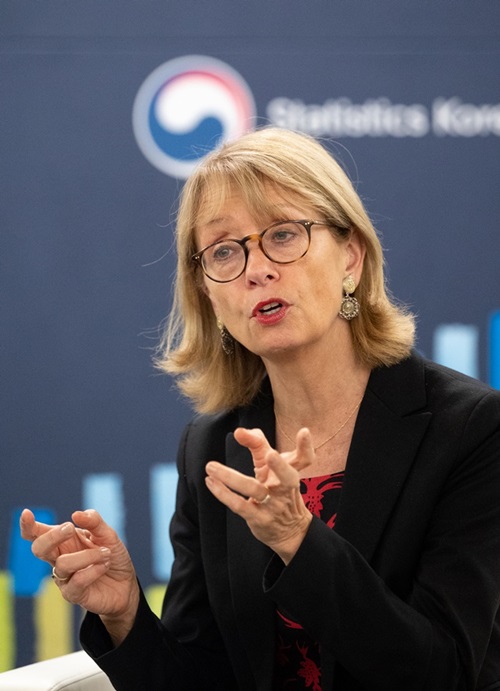-
 Korea.net's 24-hour YouTube channel
Korea.net's 24-hour YouTube channel- NEWS FOCUS
- ABOUT KOREA
- EVENTS
- RESOURCES
- GOVERNMENT
- ABOUT US


Martin Durand, director of statistics and chief statistician of the Organization for Economic Cooperation and Development (OECD), says "Better Policies for Better Lives" is the theme of the OECD's mission and that she will conduct joint research on inclusive growth with Korea.
By Park Gil-ja and Kim Minji
Photos = Kim Sunjoo
As the Moon administration enters its third year, its drive to achieve its goal of building an "inclusive nation through inclusive growth" has gained speed.
Korea.net will explore why inclusive growth is the government's top economic goal through interviews with Jung Hae-gu, chairman of the Presidential Commission on Policy Planning, and Martin Durand, director of statistics and chief statistician of the Organization for Economic Cooperation and Development (OECD), as well as the column "The Effects of Income-driven Growth Are Now Showing" by Cho Young-cheol, a visiting professor at Korea University.
The Moon administration is speeding up the implementation of its "inclusive growth" policy to achieve the goal of a "people-centered economy," with the aim of sharing the benefits of economic development with all economic players in society.
Wealth polarization and inequality of economic opportunity are global issues. The Organization for Economic Cooperation and Development (OECD) has thus agreed to conduct from March joint research with the Korean government on the latter's inclusive growth policy.
The OECD said it is determined to adopt inclusive growth, an economic system of sharing the benefits of development with all economic players, and released a framework for policy enforcement in May last year.
Inclusive growth requires attention, the OECD said, because the original growth model failed to prevent global economic crises or consider the effect on the environment. Wealth polarization and inequality of economic opportunity remain unresolved, it added, as the top 1 percent of the income bracket owns 19 percent of global wealth. The OECD said it thus chose the inclusive growth model as the best economic alternative in that it aims for more balanced development and distribution.
In an interview with Korea.net, Martin Durand, the OECD's director of statistics and chief statistician said, "'Better Policies for Better Lives' is the OECD's mission. We will be working with the Korean government and OECD experts and study inclusive growth in Korea."
Durand has promoted strategies for statistical policy over her 37 years in the global organization. She served as deputy director of employment, labor and social affairs and later supervised the OECD's work in policy toward employment, training, social welfare and health; she was appointed chief statistician in 2010.
Below are excerpts of Korea.net's interview with Durand.
-How will the OECD conduct joint research on inclusive growth with Korea?
The OECD will meet with the KDI (Korea Development Institute) but also the ministries of finance and health and welfare and other people from trade unions or employers of association to have interviews. We will gather all the information from Korea and draft the report with recommendations how to foster and promote inclusive growth in Korea. In applying the analysis, Korea will have its own way because each country is different, so each country will have a specific policy to implement. Korea is the first country to study the inclusive growth framework, but I'm sure there'll be more after that.
-What is the OECD's concept of inclusive growth?
There are two most important things in inclusive growth, which are improving productivity, making sure you invest in technology, which Korea does very well, and at the same time make sure that all parts of population are included in the growth. It's very important that we ensure that all parts of the population are included in growth. In Korea, this applies to people in the labor market who perhaps at the moment are not well integrated such as youth, the elderly and women. It's also important to foster small enterprises because many times they are innovative or creators of jobs. So it's looking at the three perspectives of people, companies and regions. So it’s where you live, who you are and where you work.

-Why does the OECD emphasize "well-being" measures over GDP?
We tend to focus on GDP to assess the health of an economy. But GDP is an imperfect measure because it only measures the total production of goods and service during a given period and income. There are number of things GDP doesn’t do, so it’s important to complement GDP with other indicators. GDP is still important and should grow. But growth has to be inclusive, and it has to actually effect the lives of all people. Inclusiveness also means sustainability and needs to happen but not at the expense of the environment.
-How is inclusive globalization possible?
Economies are more and more integrated, and it's very important that this continues in an orderly way. And there is some backlash against the globalization trend. Korea is an open economy, but not everybody gains from globalization. So we have to ensure everybody benefits from globalization and no one is left behind. We have to take care of those who lose from inclusive growth and get compensation (for them).
-What about those left behind by globalization?
Digitalization and an aging population can greatly influence people's lives. There are people who are highly skilled and benefit a lot but those with low skills will not because they will not be able to harness the benefits of digitalization. So the country has to take care of elderly people and make sure they feel like part of society.
krun@korea.kr
Below are excerpts of Korea.net's interview with Durand.
-How will the OECD conduct joint research on inclusive growth with Korea?
The OECD will meet with the KDI (Korea Development Institute) but also the ministries of finance and health and welfare and other people from trade unions or employers of association to have interviews. We will gather all the information from Korea and draft the report with recommendations how to foster and promote inclusive growth in Korea. In applying the analysis, Korea will have its own way because each country is different, so each country will have a specific policy to implement. Korea is the first country to study the inclusive growth framework, but I'm sure there'll be more after that.
-What is the OECD's concept of inclusive growth?
There are two most important things in inclusive growth, which are improving productivity, making sure you invest in technology, which Korea does very well, and at the same time make sure that all parts of population are included in the growth. It's very important that we ensure that all parts of the population are included in growth. In Korea, this applies to people in the labor market who perhaps at the moment are not well integrated such as youth, the elderly and women. It's also important to foster small enterprises because many times they are innovative or creators of jobs. So it's looking at the three perspectives of people, companies and regions. So it’s where you live, who you are and where you work.

Martin Durand, the OECD's director of statistics and chief statistician, says all economic players including the elderly, youth and women must benefit from economic growth.
-Why does the OECD emphasize "well-being" measures over GDP?
We tend to focus on GDP to assess the health of an economy. But GDP is an imperfect measure because it only measures the total production of goods and service during a given period and income. There are number of things GDP doesn’t do, so it’s important to complement GDP with other indicators. GDP is still important and should grow. But growth has to be inclusive, and it has to actually effect the lives of all people. Inclusiveness also means sustainability and needs to happen but not at the expense of the environment.
-How is inclusive globalization possible?
Economies are more and more integrated, and it's very important that this continues in an orderly way. And there is some backlash against the globalization trend. Korea is an open economy, but not everybody gains from globalization. So we have to ensure everybody benefits from globalization and no one is left behind. We have to take care of those who lose from inclusive growth and get compensation (for them).
-What about those left behind by globalization?
Digitalization and an aging population can greatly influence people's lives. There are people who are highly skilled and benefit a lot but those with low skills will not because they will not be able to harness the benefits of digitalization. So the country has to take care of elderly people and make sure they feel like part of society.
krun@korea.kr
Most popular
- China warmly welcomes first Korea-born giant panda Fu Bao
- First hearing-impaired K-pop act hopes for 'barrier-free world'
- Novelist Hwang's 'Mater 2-10' shortlisted for Int'l Booker Prize
- Expats could account for 7% of population in 20 years: report
- Nat'l Fire Agency picks 137 elite staff for deployment abroad













